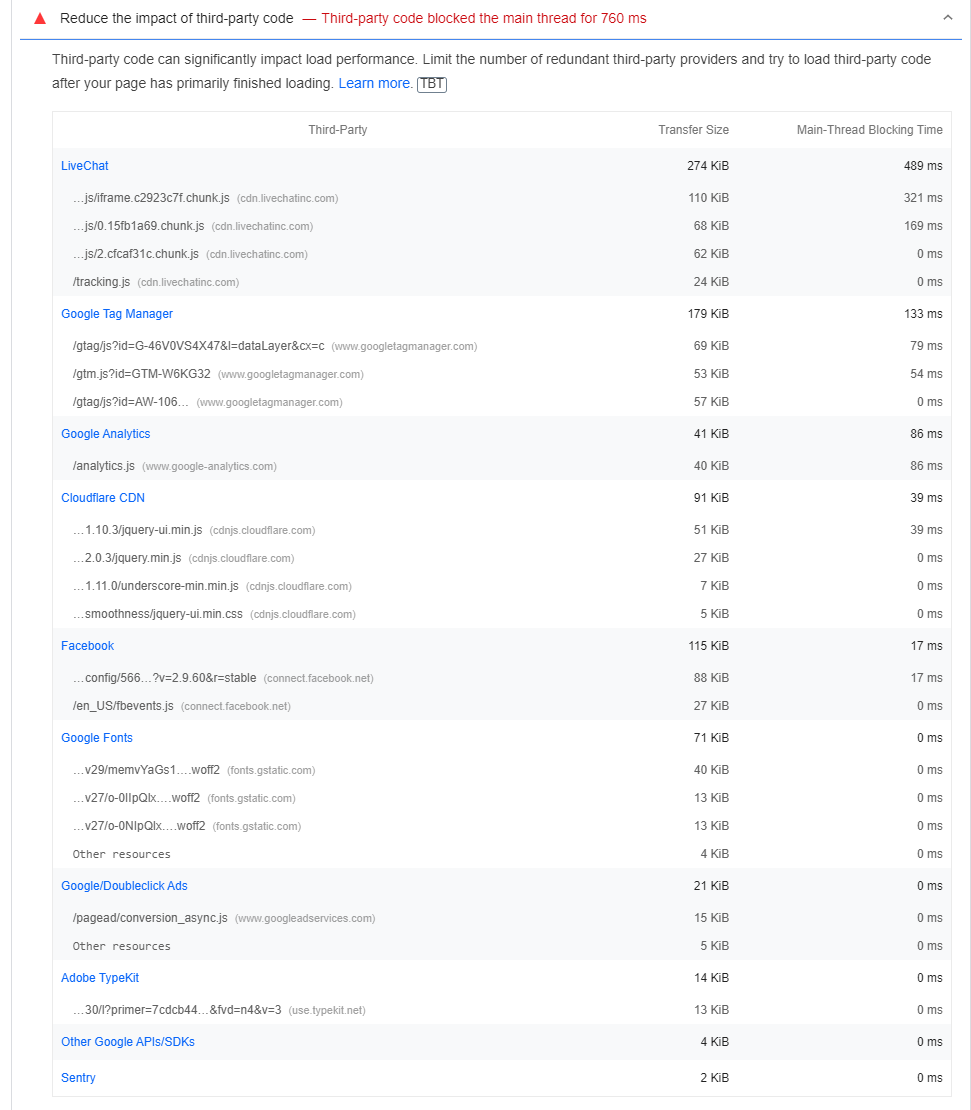What is the impact of third party scripts?
What the impact is of third party scripts on hotel websites and why we are careful with them.
The biggest cause of long loading times for websites is third-party scripts. These are often necessary but not always optimal for the site. What exactly are these scripts and how can you best deal with them?
Let's start with the most obvious question: what exactly are third party scripts? Third party scripts are literally pieces of code that come from another party than the website builder. Think of tracking tools like Google Analytics, but also conversion tools, chatbots and sometimes booking engines. Google Tag Manager is also added to the site as an external script. This is how we add scripts from external parties (asynchronously) to a website. As you can see, these added codes are actually indispensable, but we have to be careful with them.
To quote Google, there are several reasons to be careful with third party scripts, namely:
- They can affect performance
- They can affect privacy
- They can potentially affect the security of the site
- They can be unpredictable
- They can have unintended implications
We will now explain how this works and why it is relevant for your hotel website, item by item.
Negatively influencing performance
An important issue for us and for hoteliers is the influence of third party scripts on the performance of the hotel site. After all, the hotel site has to present a good image of the hotel and generate direct reservations. This only happens with a site that is fast, where everything works well and which is easily found.
To achieve this, we ensure that Becurious developed sites always perform as well as possible before applying an external script. Our templates are extensively tested for this, and custom websites are also always particularly well checked for this and improved where necessary. In this way, we can ensure that the code we deliver is optimised and up-to-date.
Loading unnecessary or non-optimised javascript is a common problem on our sites. Regularly, an entire library (a large amount of script with multiple possibilities) is loaded of which only a small number of functions are used. This slows down the loading of the actual website. This makes the website feel slower and people are more likely to click away.
An example of a site where third party scripts have been added.
Affecting privacy
We know from Google Analytics that certain things are tracked on a website. For example, the website owner can track certain statistics such as the number of visitors and the number of pages visited.
However, hoteliers often do not know exactly whether other scripts (such as chatbots or Tripadvisor awards) are tracking activities while the scripts do have this capability. This means that privacy-sensitive data can be recorded by a party you do not expect this from, and certainly do not want it from. This data can potentially be used for malicious purposes. It is also possible that, without realising it, you are in breach of the GDPR legislation.
An example of incorrect use of data is adding a price comparison tool to your website that shows the best room rate per distribution channel. This is done via an external script that allows a visitor to be fully tracked. This data is then used by the price comparator to, for example, influence the attribution of a purchase.
Website security
Hotel marketing departments often want to keep up with the latest developments in online marketing. This is obviously smart, but it does come with a risk.
When a script from, for example, a chatbot is added to the website, it is often assumed (or not even considered) whether this is safe. The script can pose a security risk. This risk may arise from unresolved vulnerabilities.
When a script uses a library that contains vulnerabilities, this is not always visible at first sight. Sometimes this is also not clear to the developer of the script (let alone the party implementing this script). To prevent problems with the security of a site caused by third-party scripts, checks and scans must be carried out regularly. In short, when you use external scripts, there is simply a risk involved.
Unpredictability
Scripts that have already been added to a site can be modified by the developer of the script without having to go through the web builder. This means that external scripts bring a certain degree of unpredictability with them.
Example: on Monday, the website works fine but after a new version of the script has been published, the site suddenly does not work properly on Tuesday. This unpredictability ensures that website builders want to be dependent on external scripts as little as possible.
Unintended implications
Fortunately, it is not the case that developers of scripts always have bad intentions and often the scripts work properly. The problem lies in certain unintended implications of the scripts.
A chatbot covering a scroll button is an innocent problem that is easy to fix. But a conversion optimisation tool that makes the website so slow that no more bookings are made is a much bigger problem. This is not caused intentionally, but unfortunately it does happen often.
Another example of a situation we regularly encounter is the use of generic class names in the source code. This can then conflict with the existing class names on the site, causing errors in the design. This is also unintentional but annoying and it results in extra work for the web builder.
How to deal with these scripts?
All in all, we can say that the use of third-party scripts can be of added value, but our advice is to be careful at all times. Think well in advance whether you really need the addition to the site. If so, is there a solution that your web builder can offer that does not require an extra script?
And if you do opt to use a script from an external party, think carefully about the implications. Does the script affect the site's performance? Does it affect the privacy of my visitors? Is the script safe? Is it possible that the script has an unwanted influence on the (design) of the site? When you have answered these questions for yourself, you can think about whether or not to apply a script.
Do you want to know more about the influence of third-party scripts on websites or the influence of scripts on your site? Then get in touch with us.
Keep reading:
Google Core Web Vitals, what are they? (TIP!)
Hotel website development - a step by step guide to a succesful website
Google: loading third party JavaScript



 English
English
 Nederlands
Nederlands